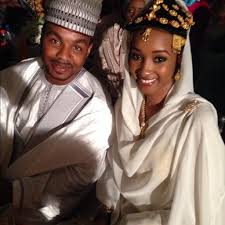


Although marriage traditions may vary from rural to urban areas,
weddings in Nigeria often follow several common customs. Formal meetings
between the couple's families, the offer of a dowry and an engagement
ceremony are all traditional events prior to a wedding ceremony. While
dating and selecting your own spouse occurs in urban areas, arranged
marriages are frequent in Nigeria.
Introduction Ceremony: Prior
to an engagement, the families of the bride and the groom become
acquainted through a formal ceremony. The groom's family usually travels
to the home of the bride's family and presents a letter requesting the
woman's hand in marriage. Traditional dances and the offer of a dowry
are part of the process to persuade the bride's family to accept the
letter. This ceremony often occurs only a few days before the wedding.
Engagement Ceremony:The
evening before the wedding day, the groom's family visits the bride's
family again. This visit is to hear the response to the letter that was
presented during the introduction ceremony. If a positive response is
given, both families are formally introduced to the guests. Friends and
family celebrate the engagement with food and drink. Often the groom's
family provides traditional foods such as palm, yam, sugar and drinks as
well as offering the bride's family a suitcase packed with traditional
clothing, bags, shoes and jewelry. The officiating elder, the person who
transferred the messages between the couple's families, drinks from a
cup of palm wine and may also invite the bride and the groom to share
the drink. When the ceremony has ended, the bride remains at her
father's house to prepare for the wedding ceremony.
Wedding Day:Depending
upon the local custom, the bride's elders may help her to bathe and
prepare for the wedding. In a traditional Nigerian wedding, the bride
usually wears imported Indian fabrics as well as a decorative
coral-beaded headpiece, ankle bracelets and necklaces. The bride's hands
and feet may be decorated with intricate henna designs. When she is
ready, the father of the bride accompanies her to the church. After the
ceremony, there is a party that frequently lasts late into the night.
Live bands may perform traditional music while everyone enjoys a meal
and dancing. After the party, the bride returns to her father's home to
change out of her wedding attire. Her new husband arrives with his
family to claim his bride and the couple departs to begin their new life
together.
Written by Betsy Bender
No comments:
Post a Comment